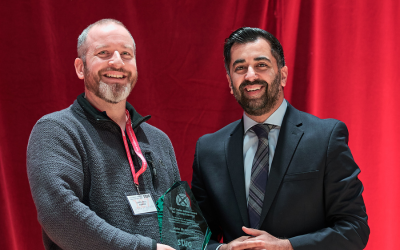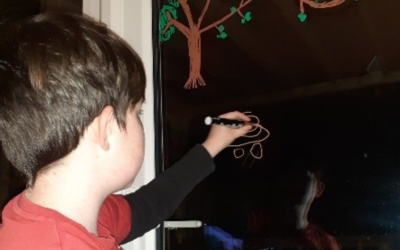You are here
200 Zambian teachers participate in development workshops with The OU and World Vision
I was part of a team of three OU academics who travelled to Zambia between May 8 and 11, to facilitate introductory workshops for The OU’s new Scottish Government funded project: Zambian Educational School-based Training (ZEST).
Over five years, this teacher development project aims to reach 4000-plus professionals across the country.
For this visit, we worked closely with our partners in World Vision to deliver the first of our large-scale workshops for all teachers within particular schools: over 200 primary and head teachers from 17 schools in Central Province.
The teachers’ enthusiasm, as well as the support demonstrated by local education officers who visited us during the week, made the experience a very fulfilling and positive one.
1) The workshops: who participated and where?
 The participating teachers - including Memory Simaloya, pictured right - and head teachers came from primary schools in three zones in Chisamba district: Chipembi, Chisamba and Liteta.
The participating teachers - including Memory Simaloya, pictured right - and head teachers came from primary schools in three zones in Chisamba district: Chipembi, Chisamba and Liteta. The workshops took place the week before the official start of term for learners, as this is a planning week for teachers and it would minimise disruption to the school schedules.
Teachers travelled to the most central primary school in the zone, where they attended a one day workshop.
Participants’ teaching experiences varied from newly-qualified teachers to teachers who had been teaching for over 25 years. And the record for number of learners a teacher had in their own class was 117!
2) What did the workshops involve?
The workshop was an introduction to the ZEST project, and presented a model of School-Based Continuing Professional Development, built on the existing Zambian Government-supported programme of Teacher Group Meetings held in each school.
The workshops explored: the benefits and challenges linked to the current practice of Teacher Group Meetings; what is meant by learner-centred education; and how The OU’s Teacher Education in Sub-Saharan Africa (TESSA) library of resources could support the Zambian primary curriculum.
The workshops ended with a practical group meeting, as well as a session to plan ahead for the meetings in the coming term.
3) What were the workshop aims?
The aims of the workshops were to become familiar with ZEST, and the free TESSA open educational resources library, as well as a guide mapping TESSA resources to the Zambian curriculum (completed by The OU with the Ministry of General Education in Zambia)..jpg)
.jpg)
This was all with a view to making Teacher Group Meetings an effective continuing professional development tool.
Throughout the day, participants worked in groups with colleagues from within their school, as well as those from other schools based on the grade they taught.
Teachers were given a Teachers’ Handbook (pictured right), a Teachers’ Notebook and a copy of the TESSA mapping guide.
The handbook includes nine learner-centred teaching approaches - such as using pair and group work in class, and using the local community and environment as a resource - with collaborative activities teachers can complete in their group meetings.
The teachers’ notebook is a tool to record their activity planning, as well as their reflections on the delivery of the activity with their own class and the activities they have observed from peers.
Each school was also given a number of TESSA libraries, which include resources for five main curriculum areas (Literacy; Numeracy; Science; Social Studies and the Arts; Life Skills).
4) What was the feedback from participants?
The participants welcomed the ZEST model of Teacher Group Meetings, where they concentrated on short activities, as opposed to their previous experience of planning and observing a full lesson.
This adapted model would allow all the teachers to try out some activities in their own lessons, and to see different types of activities from different teachers.
Although some recognised that this would require more active participation from all teachers in the school, they felt being able to plan activities to be used in their actual lessons was a positive development.
In the following video clip, Fasten Kalonde, a Grade 7 teacher at Nayamba Community School, talks about his participation in a ZEST workshop.
Memory Simaloya (pictured top right), a Grade 6 teacher at Kamono Primary School, said:
“This programme ZEST is helping us teachers because it has introduced new approaches, like questioning techniques. Also group work is involved.
It’s also encouraging us as teachers to encourage learners – in groupwork, learners will be able to express themselves, to bring up their own ideas.
“ZEST is emphasising a learner-centred approach.”
5) What is next for the project?
Our plan is to go back in September 2018, for workshops led by these teachers and head teachers, where they will share how the ZEST model is working, and we can explore any developments required to the existing model and resources for expanding the project to further districts.
This will also be part of the monitoring of the project that our colleagues in World Vision will undertake throughout this school term, along with local education officers.
In terms of resources, we are also planning on recording some audio resources in Zambia for teachers to be able to access, which will support the nine teaching approaches included in the ZEST model.
Find out more about the ZEST project on The OU's International Development Office website.
News
Media contacts
Media enquiries
OU in Scotland Media Relations:
Call 0131 549 7932
OU UK Press Office:
Call 01908 654316
Out-of-hours:
07901 515 891
Visit our OU UK news site


